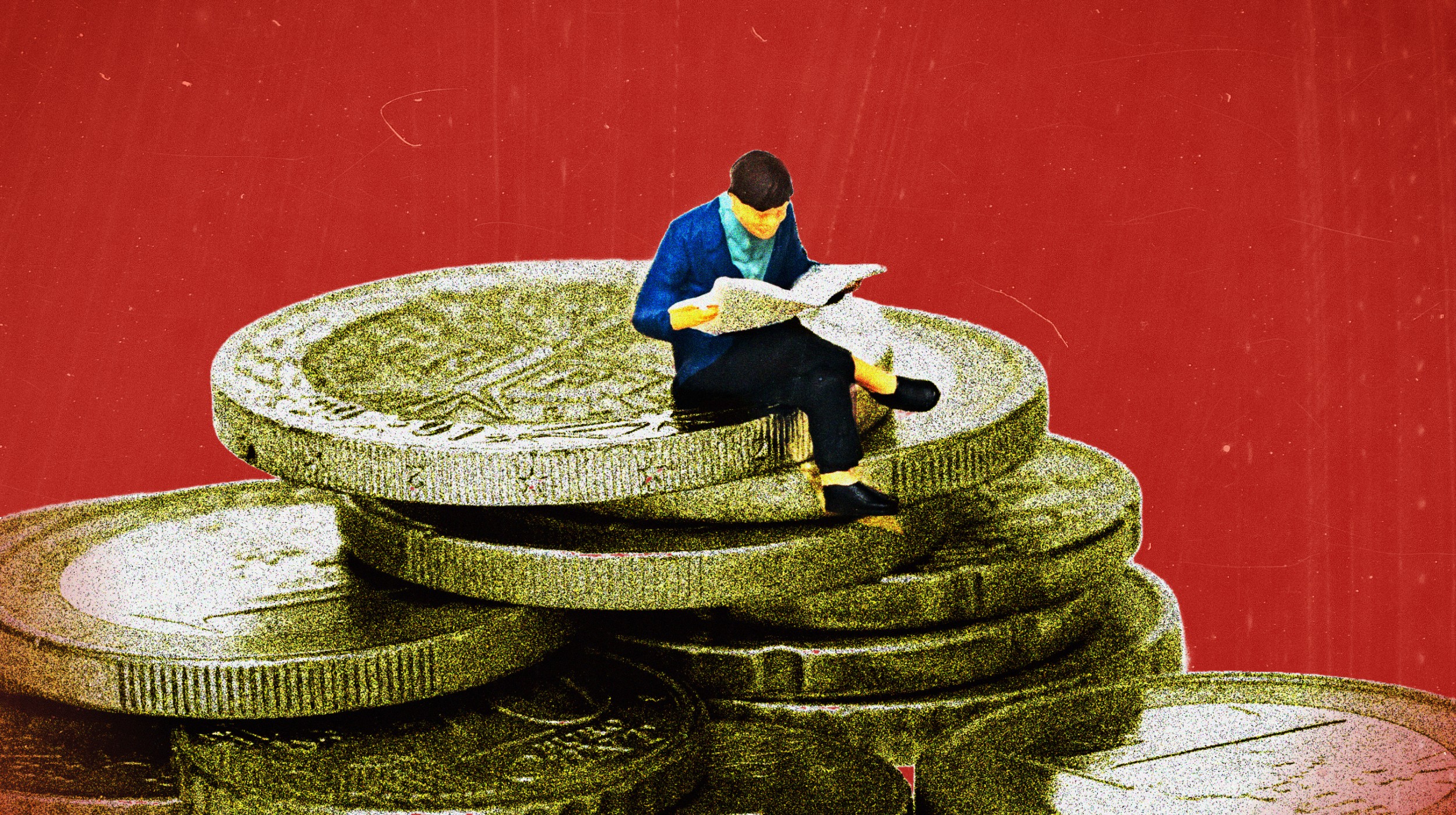What would happen if America defaulted on its debt?

- At the press time, the value was $21.7 trillion dollars.
- Lots of people know that a default would be bad, but not everybody seems to get how horrible it would be.
- While the risk is low, knowing what would happen if a default did occur is important information for all voters.
The United States government has a lot of debt. I mean a ton of it. At the time of writing, the value was 21.7 trillion dollars and climbing. This comes out to roughly 66,000 dollars per citizen. While the debt to GDP ratio today is not quite so high as it was after WWII, it is still at the unsettlingly high level of 105 percent. If the debt were visualized as a stack of one-thousand-dollar bills, it would be more than 1400 miles high. In single dollar bills, it would extend past the moon.
All of these statistics are pretty dry though. The numbers are too large to have any meaning, the percentages and ratios too arcane to prompt a reaction. Catastrophic scenarios like the government defaulting on its debt are described so abstractly that the gravity of the situation is obscured.
To make up for this, we’ll look at what would happen if the United States was unable or unwilling to pay its debt from five different perspectives, starting with the world of international finance and ending with the prices at the grocery store.
What would happen if the United States Government defaulted on its debt?
Before we begin, it is important to mention that while many countries have defaulted on their national debts before, no country so influential, so thoroughly integrated with the global economy has ever gone bust. This means that while we can look to the past for evidence, there are variables in this case with no analogs elsewhere.
So, while nobody knows for sure what would happen, we can make educated guesses and predictions using the data we have. Take these predictions with a little salt, but not too much.
International Finance
The first blows would come to the world of global finance. Investors and governments around the globe purchase U.S. government bonds. There are lots of them available to buy, and they are currently a very safe bet. While you won’t make much money on them, you are sure about getting payment at a later date.
According to former Treasury Secretary Timothy Geithner in a letter he sent Congress in 2011, a U.S. government default would cause interest rates to spike all over the world. This is because treasury bonds “represent the benchmark borrowing rate” and anything that causes them to become a less certain investment will affect the entire financial system.
The interest rates on the bonds would go up, as investors would no longer be as sure of future payment. This would send up rates on everything else and increase costs for everything from government borrowing to your car loan. The cost of doing business would go up, threatening jobs and economic growth.
If the government defaulted and either refused to pay interest or declared it would pay bonds back at a fraction of the face value, lots of bondholders would be in trouble. The sudden realization that the full repayment of these bonds was unlikely would probably lead to a stampede to unload them on anybody who would take them.
Any organization that holds lots of these securities, such as banks, pension funds, or the government of Japan, would also be in trouble; since trillions of dollars in what were previously safe assets would then be worth a fraction of their face value. Banks would suddenly become very miserly with their money and less likely to lend. Some institutions would likely find themselves suddenly in the red.
Global stocks would likely fall as well, as occurred during the 2011 debt ceiling crisis. In that case, the Dow dropped 200 points the day after the S&P changed its outlook on U.S. debt. Imagine what it would look like if something actually happened!
The U.S. Economy
It gets worse. Investors would likely pull their money out of U.S. stocks and put them into safer stocks abroad since the rising cost of business in the U.S. would make companies less profitable. This, combined with the global effects mentioned above, would likely spark a recession.
This capital flight is exactly what happened to Russia and Argentina when they defaulted, though both economies bounced back fairly quickly.
Unlike with those examples, however, the US economy is so large and connected with the rest of the world that it would probably drag everybody else down with it. A taste of this was seen in 2011 during the debt ceiling crisis when other countries’ stock markets fell in response to the chance of the U.S. not paying its bills.
People holding government debt
Despite what fearmongers might tell you, less than half of the national debt is owed to foreign governments. More than half of the total amount is owed to the federal reserve, mutual funds, public and private pension plans, insurance companies, banks, and the holders of savings bonds. All of these institutions would suddenly find themselves a lot worse off than they were the day before a default.
If the government defaulted, the people hurt the most would be retired people and anybody who hopes to retire, as the value of a large number of pension funds would fall as their assets decrease in value. Also, since the U.S. government owes the social security fund 3 trillion dollars, there will be a nice crisis on where social security money is going to come from to worry about too.
The disruption to daily life
If the likely stock market crash and increased cost of doing business described above weren’t enough, Timothy Geithner, former Secretary of the Treasury, also pointed out in his letter to Congress that the U.S. government would also have to stop paying salaries to soldiers and officials. Social Security, student loan, and Medicare payments would end once the money ran out. Money for keeping government offices open would dry up.
Essential services, which stay open during a mere government shutdown, would likely cease.This reduction in government spending would cause many businesses not to make sales or receive payment, leading to layoffs.
The effect on consumers and the working stiff
As you might have guessed, a sudden increase in unemployment is likely to follow a default. Even if you were still getting a paycheck, don’t hold bonds or owe money on loans, have a safe pension fund, and dodged the effects of a stock market crash: the inflation caused by a default would affect you.
This would mean higher prices for you at the gas station, grocery store, and at the mall; especially on imported goods. Any money you have saved away will begin to lose its value since the inflation rate will be well above the interest rate the bank is paying you. So you’ll not only be paying more out of your paycheck, but your savings will be worth less and less each time you have to dig into them to pay the bills.
In Argentina, which defaulted in December 2001, inflation spiked after the government announced it couldn’t pay its debt as capital fled the country and people lost faith in the currency. This caused prices to rise on all staple products; making life even more difficult for those left unemployed by the conditions leading to the default and causing the poverty rate to rise quickly.
How likely is any of this?
The risk of the United States government defaulting on its debt as a result of having too much of it is incredibly low. Alan Greenspan, the former chairman of the Federal Reserve, argued that it would never be necessary in any circumstance. In 2011 he reminded everybody that the United States borrows funds in money it controls the supply of, and therefore,
“The United States can pay any debt it has because we can always print money to do that. So, there is zero probability of default[1]“
Of course, there is always the problem of the U.S. just deciding to not pay its bills for the sake of a political stunt.
The United States did get a credit down rating in 2011 as a result of Congress debating whether or not to pay the bills, but while the effects can be compared to a default, it wasn’t one. Similarly, the government forgot to pay a $122-million-dollar bill in 1979, but that was only on a relatively small amount. Even that raised the cost of borrowing for everybody, however. The country also technically defaulted in 1790 and 1933 without an apocalypse occurring.
While the United States is unlikely to default on its debt, the possibility is always present. The effects of such an economic catastrophe can be difficult to imagine, but an understanding of what could happen if we aren’t careful is vital.
[1] For those of you who are screaming “Hyperinflation” right now, chill out. Hyperinflation tends to happen in countries without a robust economic base, and utter buffoons were managing their economies. The U.S. is fine for the foreseeable future.





